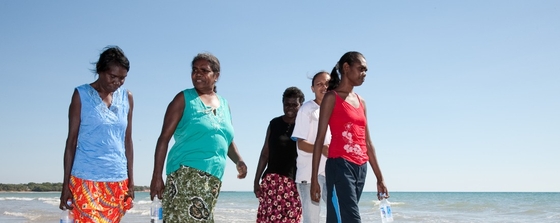
What is acute rheumatic fever and rheumatic heart disease?
Rheumatic heart disease is a serious disease that causes damage to your heart valves.
Key takeaways
- Aboriginal and Torres Strait Islander, Maori and Pacific Islander peoples are at high risk of acute rheumatic fever and rheumatic heart disease.
- It is important to get your sore throat or skin infection checked by your doctor so a Strep A infection can be treated before acute rheumatic fever develops.
- Acute rheumatic fever can cause inflammation of the heart, which can progress to rheumatic heart disease causing heart failure, disability and death.
In Australia, Aboriginal and Torres Strait Islander, Maori and Pacific Islander peoples are at high risk of acute rheumatic fever and rheumatic heart disease.
Young people aged five to 15 years are most often affected.
What is acute rheumatic fever?
Germs called group A Streptococcus (also known as Strep A) can cause infections in the throat or skin (sores). For some people the body’s immune system gets confused; as well as fighting the Strep A germs, the immune system fights specific areas of the body causing inflammation. This causes an illness called acute rheumatic fever (also known as ARF).

You may experience few symptoms, or a combination, and these symptoms do not all occur together.
See your doctor or healthcare professional if you experience ANY of these symptoms.
What is rheumatic heart disease?
Rheumatic heart disease is damage to one or more heart valves following acute rheumatic fever. There are four valves in the heart which open and close to keep blood flowing in one direction. If a valve is damaged, it might not open or close properly, meaning some blood may flow backwards or blood flow could be blocked.
Are acute rheumatic fever and rheumatic heart disease preventable?
Acute rheumatic fever can be prevented:
- Sore throats and skin scores (which could be Strep A infections) should be treated with antibiotic medicine as soon as possible.
- Antibiotic medicine is given as one injection or as tablets for a few days. It is very important to finish all tablets.
Rheumatic heart disease can be prevented:
- People who have had acute rheumatic fever once may get it again, and this increases the risk of rheumatic heart disease.
- Antibiotic medicine is usually given as an injection every 4 weeks for many years to stop acute rheumatic fever coming back.
- Future sore throats and skin sores should be treated as soon as possible.
- Future symptoms of acute rheumatic fever should be checked by a doctor or other health professional as soon as possible.
High risk people who have sore throats and skin scores should see a doctor or health professional so that Strep A infections can be treated before acute rheumatic fever develops.
ARF and RHD videos
Red Dust RHD Program - Minjilang
Check out this co-designed video featuring young people in Minjilang – a small community on Croker island 250km northeast of Darwin explaining what acute rheumatic fever and rheumatic heart disease is.
Take Heart: Deadly Heart
Powerful content that shines a light on the impact of acute rheumatic fever and rheumatic heart disease in Australia.
An Endgame for Rheumatic Heart Disease in Australia: Tenaya's Story
Aged just seven, Tenaya underwent emergency life-saving surgery to repair her heart valve as a result of developing RHD.
Michael’s Story
Watch the story of a 14-year-old Aboriginal boy named Michael and his Aunty Mary to learn what to do if your child or family member has an episode of acute rheumatic fever.
Menzies School of Health Research
The Heart Foundation supports the work Menzies School of Health Research led in the prevention, diagnosis and management of acute rheumatic fever and rheumatic heart disease. This includes ensuring the ARF and RHD Australia guidelines are reviewed and maintained on a regular basis.
For more information visit the ARF/RHD Guidelines website.
You might also be interested in...

Looking after your heart
Preventing heart disease starts with knowing what helps keep your heart strong and what can hurt it.

What is heart disease?
Heart disease can occur 10 to 20 years earlier among Aboriginal and Torres Strait Islander peoples and can lead to long-term health problems.

How to keep your heart strong
Support and resources to help you stay healthy and reduce risk of heart disease.
Last updated11 April 2025